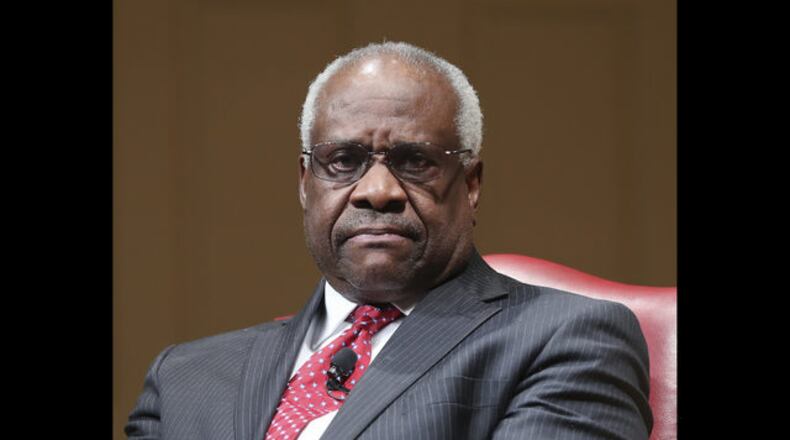Is Justice Clarence Thomas joining President Donald Trump’s war on news media?
Trump’s near-constant complaints about the “fake news” media received an unexpected boost from a solo opinion by Justice Thomas, who said the high court should make it easier for public figures to sue for libel.
Sure, it might not get anywhere. But it could.
His argument is not totally without merit. The late Justice Antonin Scalia, with whom Thomas occupied the conservative end of the high court, also criticized the landmark 1964 New York Times v. Sullivan decision that sharply limited defamation claims in state court by famous people.
Trump has said since his days as a candidate in 2016 that we should “open up” libel laws so politicians could sue the networks and big newspapers for “fake news,” which, as we have learned through ample experience, he tends to define as stories that he doesn’t like.
And Trump doesn’t confine his wrath to straight news coverage. Earlier in the week, for example, he tweeted his wrath against NBC’s “Saturday Night Live,” a program that, by the way, our former reality TV star has hosted twice and criticized many times.
This time Trump found “Nothing funny about tired Saturday Night Live on Fake News NBC!” Then he asked, “how do the Networks get away with these total Republican hit jobs without retribution? Likewise for many other shows? Very unfair and should be looked into. This is the real collusion!”
Really? “Retribution?”
Ah, how our president must envy the sweeping powers of his despotic pals such as the Philippines’ Rodrigo Duterte, Turkey’s Recep Tayyip Erdogan or Russia’s Vladimir Putin. Those guys know how to rid themselves of critics without necessarily bothering to stop in a courtroom.
We’re not there yet. But if the right case comes along and let’s say Trump’s two appointees, Neil Gorsuch and Brett Kavanaugh, agree with Thomas’ or Scalia’s views, they could help to ring a death knell for a long-standing and very important protection of free speech and political news coverage.
At issue is an appropriate case to discuss during African-American History Month. L.B. Sullivan, an Alabama county commissioner, had sued The New York Times over an advertisement it published that sought funding for Martin Luther King Jr.’s civil rights campaign. Sullivan claimed to be defamed, even though the ad did not mention his name, because it described police abuses and an “unprecedented wave of terror.” Alabama courts awarded him $500,000 in damages, a ruling unanimously reversed by the Supreme Court.
The justices set a higher standard for suing public officials, partly to protect the ability of the national press to cover the civil rights movement in the segregated South without crippling libel verdicts.
But Thomas says the court made a mistake in 1964 when it set a high barrier for public officials allegedly defamed by a story, a standard that later was expanded to include famous individuals and other, less-famous people who inject themselves into big news stories.
The ruling calls for public officials seeking damages to show the news publishers knew the report was false or otherwise displayed a “reckless disregard” for the truth.
But Thomas believes the states can set their own standards for libel without federal intrusion. The Sullivan case was wrongly decided, he said, describing it as “policy-driven decisions masquerading as constitutional law.”
He may have a technical point in saying the court was legislating from the bench, not just “calling balls and strikes,” as Chief Justice John Roberts has described the proper role of the high court.
But, as in the court’s landmark 1954 Brown v. Board of Education school desegregation decision — which Thomas, among other conservatives, also has criticized — even if they had the wrong reasoning, the justices did the right thing.
The Sullivan ruling puts a lid on the ability of offended public officials to harass or intimidate legitimate news organizations or use frivolous lawsuits to publicize themselves or their own interests.
Besides, Trump in his rage may be forgetting that libel suits cut both ways. Imagine “Crooked Hillary” Clinton, “Lyin’ Ted” Cruz and the multitude of other figures, pubic or otherwise, whom he has insulted with colorful slurs to the delight of his base.
This is the president whose false or misleading claims topped 5,000 in his first two years, according to a Washington Post tally _ and we, the voters, hardly even blink anymore when we hear that number.
Twitter-loving Trump is well familiar with the need to keep speech and the media as free as possible to express their views. Trump can dish criticism out. He needs to learn how to take it. That’s the American way.
About the Author
Keep Reading
The Latest
Featured


